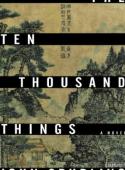
THE TEN THOUSAND THINGS - John Spurling

In the turbulent final years of the Yuan Dynasty, Wang Meng is a low-level bureaucrat, employed by the government of Mongol conquerors established by the Khublai Khan. Though he wonders about his own complicity with this regime, he prefers not to dwell on his official duties, choosing instead to live the life of the mind. Wang is an extraordinarily gifted artist. His paintings are at once delicate and confident; in them, one can see the wind blowing through the trees, the water rushing through rocky valleys, the infinite expanse of China's natural beauty.
But this is not a time for sitting still, and as The Ten Thousand Things unfolds, we follow Wang as he travels through an empire in turmoil. In his wanderings, he encounters, among many memorable characters, other master painters of the period; a fierce female warrior known as the White Tigress who will recruit him as a military strategist; and an ugly young Buddhist monk who rises from beggary to extraordinary heights.
The Ten Thousand Things is rich with exquisite observations, and John Spurling endows every description—every detail—with the precision and depth that the real-life Wang Meng brought to his painting. But it is also a novel of fated meetings, grand battles, and riveting drama, and in its seamless fusion of the epic and the intimate, it achieves a truly singular beauty. A novel that deserves to be compared to the classic Chinese novels that partly inspired it, The Ten Thousand Things is nothing short of a literary event.
John Spurling is the author of the novels The Ragged End, After Zenda, and A Book of Liszts. He is a prolific playwright, whose plays have been performed on television, radio and stage, including at the National Theatre. Spurling is a frequent reviewer and was previously for twelve years the art critic of The New Statesman. He lives in London and Arcadia, Greece and is married to the biographer Hilary Spurling.
Selected praise for THE TEN THOUSAND THINGS:
"The great strength of this novel is…the rich detail that sets the reader in the middle of China. As Wang paints waterfalls and witnesses beheadings, Spurling paints an exquisite story of a deeply decent man and his surroundings…Spurling’s novel is a work of art in itself. A thoroughly enjoyable literary sojourn by a master of historical fiction." — Kirkus Reviews (starred review)
“I was amazed by The Ten Thousand Things, and by John Spurling’s powerful imagination—with ten thousand details, he has brought the ancient Chinese artist Wang Meng to life in beautiful prose.” —Xinran, author of Message from an Unknown Chinese Mother: Stories of Loss and Love
“In this immersive tale of a landscape artist’s life, written with restrained lyricism, John Spurling has also given us an entertaining and insightful study about the art of Nature, and the nature of Art.” — Tan Twan Eng
“[Combines] the delicacy of an old Chinese landscape painting with the brutality of Chinese history . . . The narrative resounds with the vivid detail and the ever-changing tides of war and politics, art and nature.” — Publishers Weekly (starred review)
“The Ten Thousand Things is a truly remarkable achievement. In writing about the fourteenth-century Chinese artist Wang Meng, John Spurling has evoked a world that seems utterly alive and relevant today. Dramatic, absorbing, tender and profound, Spurling's book is written with a level of exquisite descriptive detail that makes the reader feel as if led into the enchanted and forbidding landscape of one of Wang Meng's own real-life works. Anybody who feels despondent about the future of fiction should read and take heart from this extraordinary and wonderful book.” — Miranda Seymour
“This is mostly a quiet novel, but a rich one . . . Readers will feel lucky to watch [Wang Meng's] journey and share his thoughts.” — Booklist
“This is an extraordinary novel. Spurling brings together his strengths as a dramatist, an art critic, and a novelist. It is an impressive combination that gives a tone of authenticity to his absorbing story and adds to its enjoyment. I look forward to the film.” — Michael Holroyd
“Wang Meng is one of the most fascinating figures in Chinese history. In this lucid and brilliant novel, John Spurling uses him as a key character to recreate the end of an empire. A vivid evocation of a turbulent era with echoes of debates today about loyalty, choices, and artistic integrity.” — Rana Mitter
***********
Osoby zainteresowane tytułem proszone są o kontakt z Agatą Żabowską pod adresem agata@literatura.com.pl
